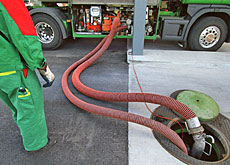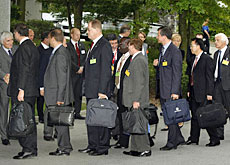Climate Cent Foundation has good first year

A foundation set up in Switzerland to lower carbon dioxide emissions says that in its first year it has signed contracts covering reductions of 3.6 million tons.
The Climate Cent Foundation is optimistic that the contractual targets set by the Swiss government will be met.
In an agreement with the government, the Foundation has committed itself to achieving CO2 emissions reductions amounting to nine million tons over 2008-2012.
The Foundation – made up of representatives of industry, oil and gas companies, the Swiss Business Federation (economiesuisse) and the Touring Club of Switzerland – has launched four investment programmes in Switzerland in the past 12 months.
Abroad, the Foundation has purchased Kyoto certificates generated by different projects.
The Foundation has had annual revenues since October 1, 2005 of around SFr100 million ($79 million), generated by a charge levied on petrol and diesel imports at a rate of 1.5 centimes per litre.
Earlier this year the Foundation submitted a provisional business plan to the Federal Environment Office, which outlined the double strategy with which it plans to meet its target of a nine-million-tonne reduction in emissions.
The Foundation invests around two-thirds of its total resources of SFr740 million in national projects involved in buildings renovation, transport, industrial process heat, waste heat recovery and space heat.
In addition, it deploys SFr200 million abroad for the purchase of Kyoto certificates stemming from high-quality projects.
National programmes
At home, the Foundation launched four investment programmes in June and July 2006: the Buildings Programme, the Auction Programme, the Intermediaries Programme and the Large-scale projects Programme.
Within the framework of the Buildings Programme, contracts with 122 project applicants representing every region of Switzerland had been signed as of October 1. The total contributions of SFr1.6 million should trigger reductions of 5,000 tonnes of CO2.
In the Auction Programme’s first auction round, 55,000 tonnes of CO2 were offered, of which the Foundation purchased 50,000 tonnes at an average price of SFr85.
Through the Intermediaries Programme, seven so-called intermediaries are procuring projects for the Foundation. As of October 1, 47 projects had been submitted, totalling an estimated volume of CO2 reductions of 140,000 tonnes.
Within the framework of the Large-scale projects Programme, which has been designed for selected projects offering a minimum volume of CO2 reductions of 2,000 tonnes a year, five projects with an estimated volume of reductions of 760,000 tonnes had been submitted by October 1.
In its activities abroad, the Foundation plans to purchase ten million tonnes of Kyoto certificates abroad. It has already secured the first two purchase agreements for certificates generated by projects, covering a total volume of 540,000 tonnes.
Targets
The Foundation aims to submit its final business plan to the Federal Environment Office by June 30 next year.
This will state how the Foundation’s reduction targets are to be achieved.
David Syz, president of Foundation Council, is confident these targets can be met or even exceeded.
“A review of the Climate Cent Foundation’s first year of work… confirms that the introduction by the Swiss industry of a voluntary charge of 1.5 centimes per litre of fuel is an effective and efficient instrument contributing in a substantial manner to reducing CO2 emissions and thus meeting Switzerland’s Kyoto commitments,” he said.
swissinfo with agencies
The Swiss CO2 law formally took effect in 2000 and foresees additional measures if the targets can’t be met with voluntary means.
Last October the authorities agreed to introduce a levy on petrol and diesel on a trial basis, following opposition against a mandatory CO2 emission tax.
Property owners are challenging plans for the CO2 tax on heating oil, arguing instead for a voluntary levy.
In 2004 CO2 emissions stood at 41.4 million tons compared with 41.1 in 1990.
The Kyoto Protocol, an amendment to the UN Convention on Climate Change, was approved in 1997 and came into force in 2005. It has been ratified by industrialised countries – apart from the United States and Australia – and by a large number of developing countries.
It calls for industrialised nations to reduce harmful emissions by an average of 5.2% below 1990 levels by 2012.
Switzerland has pledged a 10% reduction in CO2 levels (compared with 1990) by 2010, the equivalent of four million tons of CO2.

In compliance with the JTI standards
More: SWI swissinfo.ch certified by the Journalism Trust Initiative











You can find an overview of ongoing debates with our journalists here . Please join us!
If you want to start a conversation about a topic raised in this article or want to report factual errors, email us at english@swissinfo.ch.